
Robert Dennis Crumb is an American cartoonist who often signs his work R. Crumb. His work displays a nostalgia for American folk culture of the late 19th and early 20th centuries, and satire of contemporary American culture.
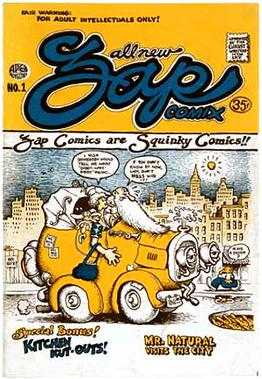
Underground comix are small press or self-published comic books that are often socially relevant or satirical in nature. They differ from mainstream comics in depicting content forbidden to mainstream publications by the Comics Code Authority, including explicit drug use, sexuality, and violence. They were most popular in the United States in the late 1960s and 1970s, and in the United Kingdom in the 1970s.
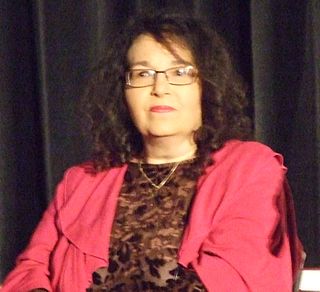
Melinda Gebbie is an American comics artist and writer, known for her participation in the underground comix movement. She is also known for creating the controversial work Fresca Zizis and her contributions to Wimmen's Comix, as well as her work with her husband Alan Moore on the three-volume graphic novel Lost Girls and the Tomorrow Stories anthology series.
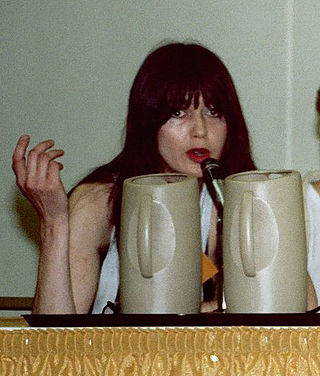
Dorothea Antoinette "Dori" Seda was an artist best known for her underground comix work in the 1980s. She occasionally used the pen name "Sylvia Silicosis." Her comics combined exaggerated fantasy and ribald humor with documentation of her life in the Mission District of San Francisco, California.
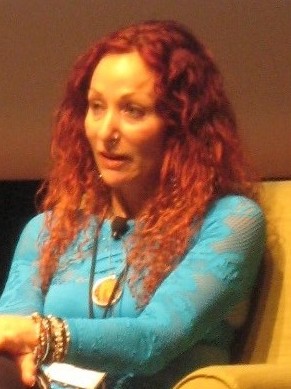
Aline Kominsky-Crumb was an American underground comics artist. Kominsky-Crumb's work, which is almost exclusively autobiographical, is known for its unvarnished, confessional nature. In 2016, ComicsAlliance listed Kominsky-Crumb as one of twelve women cartoonists deserving of lifetime achievement recognition. She was married to cartoonist Robert Crumb, with whom she frequently collaborated. Their daughter, Sophie Crumb, is also a cartoonist.

Weirdo was a magazine-sized comics anthology created by Robert Crumb and published by Last Gasp from 1981 to 1993. Featuring cartoonists both new and old, Weirdo served as a "low art" counterpoint to its contemporary highbrow Raw, co-edited by Art Spiegelman.

Phoebe Louise Adams Gloeckner is an American cartoonist, illustrator, painter, and novelist.

Trina Robbins was an American cartoonist. She was an early participant in the underground comix movement, and one of the first women in the movement. She co-produced the 1970 underground comic It Ain't Me, Babe, which was the first comic book entirely created by women. She co-founded the Wimmen's Comix collective, wrote for Wonder Woman, and produced adaptations of Dope and The Silver Metal Lover. She was inducted into the Will Eisner Hall of Fame in 2013 and received Eisner Awards in 2017 and 2021.
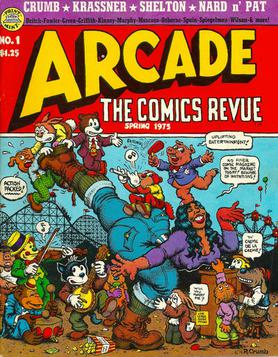
Arcade: The Comics Revue is a magazine-sized comics anthology created and edited by cartoonists Art Spiegelman and Bill Griffith to showcase underground comix. Published quarterly by the Print Mint, it ran for seven issues between 1975 and 1976. Arriving late in the underground era, Arcade "was conceived as a 'comics magazine for adults' that would showcase the 'best of the old and the best of the new comics'". Many observers credit it with paving the way for the Spiegelman-edited anthology Raw, the flagship publication of the 1980s alternative comics movement.

Diane Robin Noomin was an American comics artist associated with the underground comics movement. She is best known for her character DiDi Glitz, who addresses transgressive social issues such as feminism, female masturbation, body image, and miscarriages.
Joyce Farmer is an American underground comix cartoonist. She was a participant in the underground comix movement. With Lyn Chevli, she created the feminist anthology comic book series Tits & Clits Comix in 1972.

Tits & Clits Comix is an all-female underground comics anthology put together by Joyce Farmer and Lyn Chevli, published from 1972 to 1987. In addition to Farmer and Chevli, contributors to Tits & Clits included Roberta Gregory, Lee Marrs, and Trina Robbins.
Krystine Kryttre is an American alternative comics artist, painter, animator, writer, and performer from San Francisco. currently based in Los Angeles. Her work is dark, often explicit, and visually distinctive." Her work has been exhibited in galleries since the late 1980s, including a number of solo shows in Los Angeles.
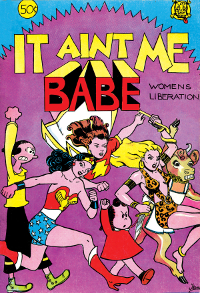
It Ain't Me Babe Comix is a one-shot underground comic book published in 1970. It is the first comic book produced entirely by women. It was co-produced by Trina Robbins and Barbara "Willy" Mendes, and published by Last Gasp. Robbins and other staff members from a feminist newspaper in Berkeley, California, also called It Ain't Me, Babe, contributed. Many of the creators from the It Ain't Me Babe comic went on to contribute to the long-running series Wimmen's Comix.
Suzy Varty is a noted British comics artist, writer, and editor. In the late 1970s, she compiled, contributed to and edited Heröine, the first anthology of comics by women to be published in the U.K. Throughout the 70s, she was part of the Birmingham Arts Lab, and she has participated in the Underground Comix and Wimmen's Comix movements in the U.S. Varty remains active in the British Comics scene, frequently appearing at such conventions as Thought Bubble Comic Arts Festival in Leeds and the Canny Comic Con in Newcastle.
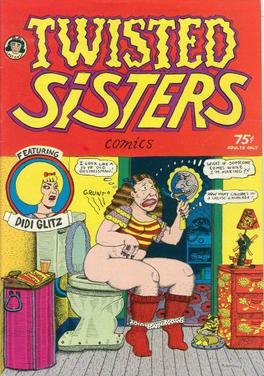
Twisted Sisters is an all-female underground comics anthology put together by Aline Kominsky and Diane Noomin, and published in various iterations. In addition to Kominsky and Noomin, contributors to Twisted Sisters included M. K. Brown, Dame Darcy, Julie Doucet, Debbie Drechsler, Mary Fleener, Phoebe Gloeckner, Krystine Kryttre, Carol Lay, Dori Seda, and Carol Tyler.

Young Lust was an underground comix anthology published sporadically from 1970 to 1993. The title, which parodied 1950s romance comics such as Young Love, was noted for its explicit depictions of sex. Unlike many other sex-fueled underground comix, Young Lust was generally not perceived as misogynistic. Founding editors Bill Griffith and Jay Kinney gradually morphed the title into a satire of societal mores. According to Kinney, Young Lust "became one of the top three best-selling underground comix, along with Zap Comix and The Fabulous Furry Freak Brothers".

Cartoonists Co-op Press was an underground comix publishing cooperative based in San Francisco that operated from 1973 to 1974. It was a self-publishing venture by cartoonists Kim Deitch, Bill Griffith, Jerry Lane, Jay Lynch, Willy Murphy, Diane Noomin, and Art Spiegelman. Cartoonist Justin Green's brother Keith acted as salesman/distributor, and the operation was run out of Griffith's apartment.
Angela Bocage is a bisexual comics creator who published mainly in the 1980s and 1990s. Bocage was active in the queer comics community during these decades, publishing in collections like Gay Comix,Strip AIDS USA, and Wimmen's Comix. Bocage also created, edited, and contributed comics to Real Girl, a comics anthology published by Fantagraphics.
Sharon Rudahl is an American comic artist, illustrator and writer. She was one of the first female artists who contributed to the underground comix movement of the early 1970's. In 1972, she was part of the women's collective that founded Wimmen's Comix, the first on-going comic drawn exclusively by women.















